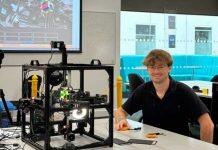With only “hello” and “how are you” in her English vocabulary, Shahnaza Hamidullah headed into her first day of school in Canada as a determined eighth grader.


Relying on hand motions to communicate with teachers and fellow students, she remembers being given a locker but not being able to find her way back at the end of the day, struggling to ask for directions.
Thirteen years later, Hamidullah is now an MD/PhD candidate at Schulich School of Medicine & Dentistry and a 2023 recipient of a Vanier Canada Graduate Scholarship, the country’s most prestigious award for doctoral students.
“To go from a girl who couldn’t speak English to getting an MD/PhD and a Vanier scholarship, I feel like I’m living a dream,” she said.
“I feel so incredibly privileged to have had this chance given to me by my parents, by Canada, really everyone involved in getting me here.”
Born in Tashkent, Uzbekistan, Hamidullah moved to Guelph, Ont. at age 13. Her parents were refugees from Afghanistan who had first sought asylum in Uzbekistan, before coming to Canada.
From an early age, they emphasized the importance of education to Hamidullah and her siblings. “Growing up around more traditional gender roles and expectations of women, my parents went against the norm and always encouraged us to get educated,” she said. “They instilled a love of education in me.”
After completing an undergraduate degree in biomedical sciences at the University of Guelph, Hamidullah pursued a master’s program, focusing on neuroscience.
She worked with Jibran Khokhar at Guelph – one of the first graduate students in his lab – studying how drugs of abuse impact neurodevelopment during adolescence. Khokhar is now an associate professor of anatomy and cell biology at Schulich Medicine and the new Canada Research Chair in Translational Neuropsychopharmacology at Western.
“Being part of the research environment pushed me out of my comfort zone,” said Hamidullah. “I was used to studying and memorizing information, but with research, the field continues to change and evolve and taps into my curiosity to fuel new discoveries.”
The future clinician-scientist says the exposure to basic science and clinical environments as part of her training provides an important balance.
“I appreciate bringing the human perspective to my research,” she explained. “The opportunity and privilege to interact with patients, learning people’s stories, gives me the motivation to do the research and ask the important questions.”
As a Vanier scholar, Hamidullah also hopes to use her platform to promote the value of education. She currently sits on education committees with the Canadian Medical Association, supporting access initiatives aimed at removing barriers for equity deserving groups.
Her thoughts often turn to the young women and girls in Afghanistan, including her younger cousins, who are now unable to pursue their education. It provokes a deep sense of responsibility.
“There are many powerful Afghan Canadian women, and my hope is that, together, we can create an amplified voice. I hope we can spark something in those girls and give them hope for their future; that they see how far this one refugee girl has come and start to dream big.” – Shahnaza Hamidullah, MD/PhD candidate, Schulich School of Medicine & Dentistry
“There are many powerful Afghan Canadian women, and my hope is that, together, we can create an amplified voice. I hope we can spark something in those girls and give them hope for their future; that they see how far this one refugee girl has come and start to dream big.”
This fall, Hamidullah is entering her fourth year of the School’s MD/PhD program and her second year of fast-tracked PhD studies. Having already completed two years of undergraduate medical training, she’ll return to medical school to finish her final two years after completing the PhD portion of the program, graduating in 2027.
In total, it’s a seven-year journey.
“It takes a village to raise a clinician-scientist,” she said with a laugh. “I’m grateful to be surrounded by supportive, positive people.”
Working with neuroscientists Lisa Saksida and Timothy Bussey in the Translational Cognitive Neuroscience Lab, Hamidullah is exploring the brain changes underlying cognitive impairments in schizophrenia.
The hallmark of schizophrenia is psychosis, including hallucinations and delusions, but less is known about the cognitive symptoms, which impact nearly all patients living with the mental illness. Using advanced imaging techniques and touchscreen testing, Hamidullah is looking at two types of brain dysfunction and how they relate.
By understanding what is happening in the brain, she is hopeful better treatment options will follow.
“One of the best predictors of quality of life for patients is cognitive function,” she explained. “If we can treat patients experiencing cognitive impairment, they will be better able to integrate into society, engage with family and friends, and enjoy life.”







































